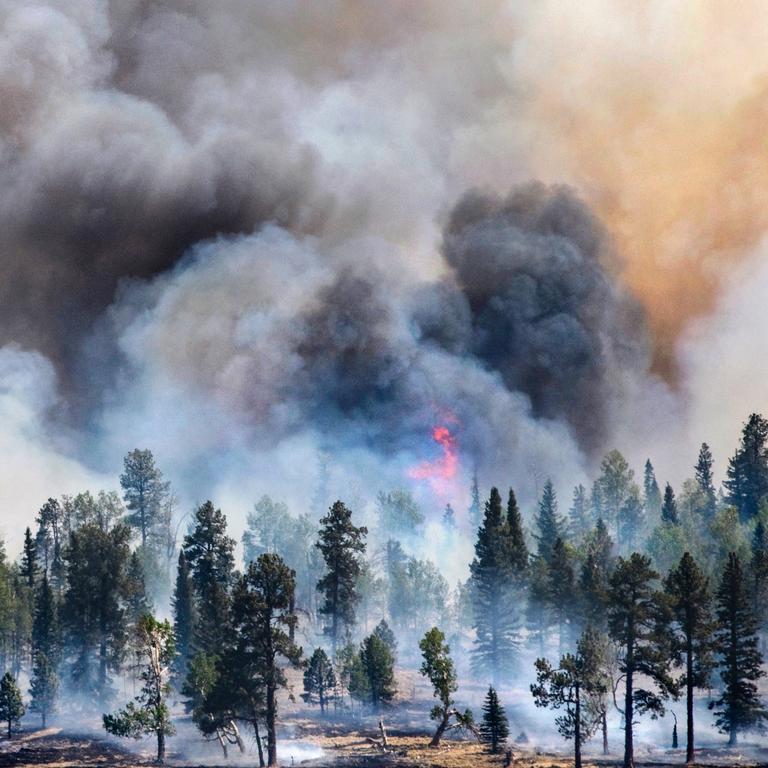
The Wallow Fire in 2011 burned 538,000 acres and was the largest in Arizona history.
How to Prepare for a Wildfire
Historic wildfires across the United States are putting children at great risk. Wildfires have become a frightening new normal, in part due to the worsening climate crisis, and can destroy or disrupt infrastructure critical to children’s well-being, including schools, homes, health facilities and transportation.
A wildfire is an uncontrolled fire often occurring in open areas like forests, fields or parks. Wildfires can begin unnoticed, but they spread quickly – igniting plants, trees and homes.
According to the National Interagency Fire Center (NIFC), a total of 52 fires have been reported nationwide in 2025 thus far.
This year, it's even more important to be prepared should an emergency strike. The Centers for Disease Control and Prevention has issued guidance for people living in areas affected by wildfires. Save the Children also offers these wildfire safety tips to show parents what to do in the event of an emergency.
How to Prepare For A Wildfire:
1. Talk about wildfires.
Spend time with your family discussing why wildfires occur. Explain how to prevent wildfires and what to do if one occurs. Use simple age-appropriate words.
2. Know your wildfire risk.
Learn your area's risk of wildfires, particularly if you live near forests, in rural areas, or in a dry climate. Contact your local fire department, state forestry office, or other emergency response agencies for information on fire laws and wildfire risk.
The CDC also notes that wildfire smoke can irritate your lungs, cause inflammation and affect your immune system. Take extra care to protect children against wildfire smoke. Children with asthma and chronic health issues may have more symptoms, including trouble breathing, when smoke or ash is present.
3. Learn about caregivers’ disaster plans.
If your child’s school or childcare center is in an area at risk for wildfires, learn their wildfire emergency plan and evacuation plan. You may be required to pick up children from another location. Review these plans with your children.
4. Practice evacuation drills.
Practice evacuation drills with children to ensure they can evacuate quickly and safely if a wildfire occurs. Plan and practice two different routes from your neighborhood, learn your evacuation routes with your household and pets, and identify alternative destinations in case one route is blocked.
What to Do During a Wildfire:
5. Stay informed.
If a wildfire is approaching, listen regularly to local radio or TV stations for updated emergency information. Follow the instructions of local officials as they will know the safest evacuation route.
6. Have supplies ready.
If you must evacuate, wear protective clothing such as sturdy shoes, long pants (denim, cotton or wool is best) and long-sleeved shirts and gloves. Make sure to have your wildfire emergency supplies ready by building a kit that includes basic emergency items.
Lock your home and take a wildfire emergency kit with you.
7. Avoid smoke and fumes.
Keep children, babies and infants away from areas where there is smoke or fumes and stay indoors if possible. Smoke produced by the wildfire may cause breathing problems or contain poisonous toxins.
What to Do After a Wildfire:
8. Use caution when returning to a burned area.
Get permission from fire officials before returning to a burned area. Look out for hazards such as fallen wires and ash pits and be alert as fire re-ignition may be possible.
9. Clean up safely.
Follow public health guidance on safe cleanup of fire ash and safe use of masks and/or respirators. Keep children away from burned sites until cleanup is complete.
10. Limit media exposure.
Protect children from seeing too many sights and images of the wildfire, including those on the internet, TV or newspapers.
How can I help children and families impacted in emergencies?
Save the Children is an expert at supporting the immediate and long-term recovery of children and their caregivers. Recovering from a disaster will take years. That's why Save the Children works in the U.S. and around the World to help children, their families and their communities every day, and in times of crisis.
When generous people like you make your 100% tax-deductible gift, children's lives are saved and their futures are brighter.
